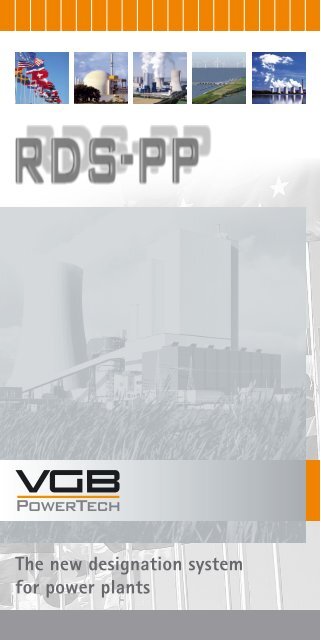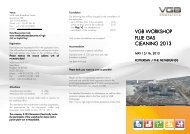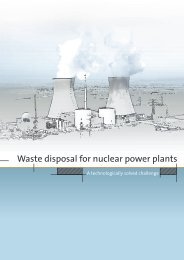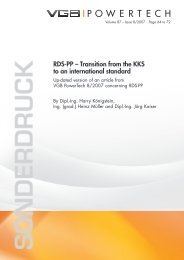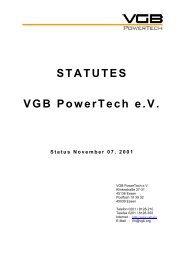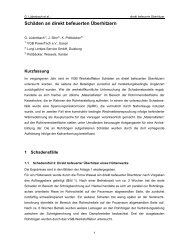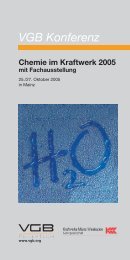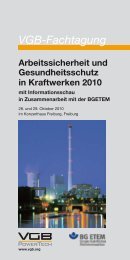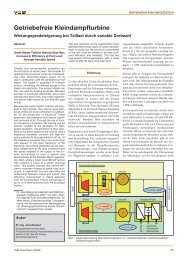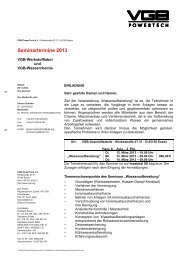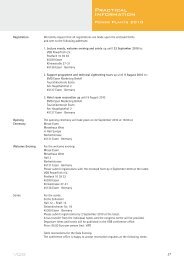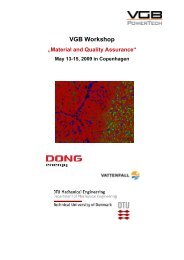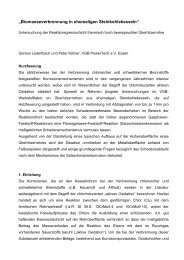The way from KKS to - VGB PowerTech
The way from KKS to - VGB PowerTech
The way from KKS to - VGB PowerTech
Create successful ePaper yourself
Turn your PDF publications into a flip-book with our unique Google optimized e-Paper software.
<strong>The</strong> new designation system<br />
for power plants
What is ?<br />
„Reference Designation System for Power Plants“<br />
– abbreviated RDS-PP –<br />
is the new designation system for power plants and<br />
related components.<br />
RDS-PP is an up-<strong>to</strong>-date replacement for the well-established<br />
<strong>KKS</strong> designation system. It offers a set of improvements<br />
and extensions which meet <strong>to</strong>day’s requirements for<br />
designation of power plant components. Opposite the <strong>KKS</strong>,<br />
RDS-PP was developed further in view of the designation of<br />
new types of generating units, e.g. decentralized generating<br />
plants.<br />
With respect <strong>to</strong> basic and specific structuring principles,<br />
the new designation system is based on international standards.<br />
<strong>The</strong> <strong>VGB</strong> Working Group “Reference Designation and<br />
Plant Documentation“ have a significant contribution in<br />
the development of RDS-PP and respectively the underlying<br />
national and international standards.
What is new about ?<br />
RDS-PP has modernized <strong>KKS</strong><br />
<strong>The</strong> development of RDS-PP was largely based on <strong>KKS</strong>,<br />
which has been well reputed for nearly 30 years. <strong>The</strong>refore,<br />
the basic structure known <strong>from</strong> <strong>KKS</strong>, as well as essential<br />
parts of the function key have been transferred in<strong>to</strong><br />
RDS-PP.<br />
<strong>The</strong> structuring principles known <strong>from</strong> <strong>KKS</strong> have been<br />
revised <strong>to</strong> allow for a more consistent structuring on all<br />
levels. Moreover, a couple of problems with the application<br />
of <strong>KKS</strong> could be eliminated.<br />
In the course of the standardization activities, terms and<br />
structures of the function key have been harmonized on<br />
international level.<br />
In addition, RDS-PP does not only allow for the classification<br />
according <strong>to</strong> products and/or components. RDS-PP also<br />
features the ability for object and/or task oriented assignment,<br />
thus enabling structuring in accordance with functions<br />
and functional units respectively.<br />
<strong>The</strong> RDS-PP has been enlarged<br />
Compared <strong>to</strong> <strong>KKS</strong>, a few of extensions have been introduced<br />
in<strong>to</strong> RDS-PP. <strong>The</strong>y mainly address the ability <strong>to</strong> designate<br />
new instrumentation & control components, such as<br />
e.g. bus systems, as well as decentralized generation plants.<br />
In addition, the uniform and standards-compliant designation<br />
of signals, connections and documents is supported by<br />
RDS-PP.<br />
RDS-PP is international<br />
RDS-PP has been standardized at international level, and<br />
therefore accepted world-wide.
Why is introduced ?<br />
RDS-PP provides reliability<br />
International harmonization and the consistent structure of<br />
RDS-PP help <strong>to</strong> avoid designation errors and misunderstandings,<br />
thus increasing plant reliability.<br />
Through the integration in<strong>to</strong> international<br />
agreed upon standards,<br />
RDS-PP substantially contributes <strong>to</strong><br />
the fulfillment of legal safety requirements,<br />
given in the European<br />
Directives e.g. in the Machinery Directive,<br />
as well as in numerous national<br />
legislative acts.<br />
RDS-PP is a cost-saving<br />
Like already the <strong>KKS</strong>, RDS-PP is a common standard for<br />
opera<strong>to</strong>rs and manufacturers of power plants. <strong>The</strong> now<br />
world-wide acceptance is opening up additional opportunities<br />
for long-term cost savings at the planning, building<br />
and operation of power plants.<br />
In addition, the reference structure<br />
laid down in RDS-PP has the potential<br />
of raising considerable synergy<br />
effects with respect <strong>to</strong> consistent IT<br />
based document management solutions.<br />
RDS-PP is IT compatible<br />
Due <strong>to</strong> its consistent structure, RDS-PP can<br />
be used as a powerful navigation <strong>to</strong>ol <strong>to</strong><br />
obtain complex information for planning, operation and<br />
maintenance. RDS-PP is a suitable basis for the development<br />
of software applications, which can be integrated in<strong>to</strong><br />
existing IT-landscapes. <strong>The</strong>se are applicable for operational<br />
tasks as well as for training purposes.
When is available?<br />
<strong>The</strong> work on RDS-PP is finished. <strong>The</strong> relevant standards are<br />
available on German national level.<br />
<strong>The</strong> work on the international<br />
standards is<br />
also completed regarding<br />
its content and the<br />
finalization is pushed<br />
with high pressure. <strong>The</strong><br />
publication is expected<br />
by the end of 2007.<br />
<strong>The</strong> change-over <strong>from</strong><br />
<strong>KKS</strong> <strong>to</strong> RDS-PP oppose principally no obstacles. At least for<br />
new plant projects a change <strong>to</strong> RDS-PP is recommendable<br />
as soon as possible.<br />
<strong>The</strong> members of the <strong>VGB</strong> Working Group “Reference Designation<br />
and Plant Documentation” will continue <strong>to</strong> be engaged<br />
intensively with RDS-PP, with a view of supporting<br />
the enterprises with the introduction and application of<br />
RDS-PP in manifold means.<br />
<strong>The</strong> change-over <strong>to</strong> RDS-PP will certainly cause some additional<br />
efforts. However,<br />
this will be a small<br />
amount in comparison<br />
<strong>to</strong> the long-term economic<br />
advantages, resulting<br />
<strong>from</strong> the application<br />
of this new designation<br />
system for all<br />
persons involved.
<strong>The</strong> IT-<strong>to</strong>ol for<br />
<strong>The</strong> IT-<strong>to</strong>ol is providing all information needed for plant<br />
designation using RDS-PP in a quick and simple manner.<br />
<strong>The</strong> introduction portal allows <strong>to</strong> access <strong>to</strong> individual designations<br />
and the related documentation in multiple <strong>way</strong>s.<br />
<strong>The</strong>se are among others the areas of the designation of<br />
signals and components, the <strong>VGB</strong> list of abbreviations,<br />
the Application Explanations and the related national and<br />
international standards.<br />
<strong>The</strong>rewith the IT <strong>to</strong>ol <strong>to</strong> RDS-PP is offering a wide range<br />
of features suitable for training, as well as the presentation<br />
of general and detailed information on plant designation.<br />
It is also an elegant<br />
<strong>to</strong>ol <strong>to</strong> support<br />
the project<br />
engineering of<br />
power plants.
<strong>The</strong> <strong>way</strong> <strong>from</strong> <strong>KKS</strong> <strong>to</strong><br />
<strong>The</strong> function and/or system code of <strong>KKS</strong> and RDS is identical<br />
in wide ranges or can clearly be assigned.<br />
Relations can be established for the equipment unit key<br />
and component key. Guides for the conversion are available<br />
at the <strong>VGB</strong> office.<br />
<strong>The</strong> following table indicates some examples for the conversion<br />
<strong>from</strong> the <strong>KKS</strong> Function key <strong>to</strong> the RDS-PP System<br />
key.<br />
Note identical clear correlation correlation<br />
correlation required required<br />
1:1 1:1 1:n n:1<br />
<strong>KKS</strong> (a) LAC BAA U PB, PD,PH<br />
RDS-PP (b) LAC MSA U, Z PU<br />
Correlation<br />
(a) = (b) (a) → (b) (a) → (b1), (a1), (a2),<br />
(b2) (a3) → (b)<br />
Commentary of code letters:<br />
LAC <strong>KKS</strong>: Feed water pump system<br />
RDS-PP: Feed water conveyance system<br />
BAA <strong>KKS</strong>: Genera<strong>to</strong>r lead<br />
MSA RDS-PP: Genera<strong>to</strong>r lead<br />
PB <strong>KKS</strong>: Circulating (main cooling) water treatment system<br />
PD <strong>KKS</strong>: Service (secondary cooling) water treatment system,<br />
conventional area<br />
PH <strong>KKS</strong>: Closed cooling water treatment system for conventional area<br />
PU RDS-PP: Common equipment for cooling water system<br />
U <strong>KKS</strong>: Structure<br />
U RDS-PP: Structures and areas for systems<br />
in the power plant process<br />
Z RDS-PP: Structures and areas for systems outside of the<br />
power plant process
Do you have questions<br />
about ?<br />
Further questions and need on information you can gladly<br />
address <strong>to</strong> the <strong>VGB</strong> office as well as <strong>to</strong> the experts of the<br />
Working Panel "Reference Designation and Power Documentation".<br />
Contact:<br />
<strong>VGB</strong> <strong>PowerTech</strong><br />
Klinkestraße 27-31 · 45136 Essen · Germany<br />
Phone + 49 201 8128 288<br />
joerg.kaiser@vgb.org<br />
www.vgb.org


